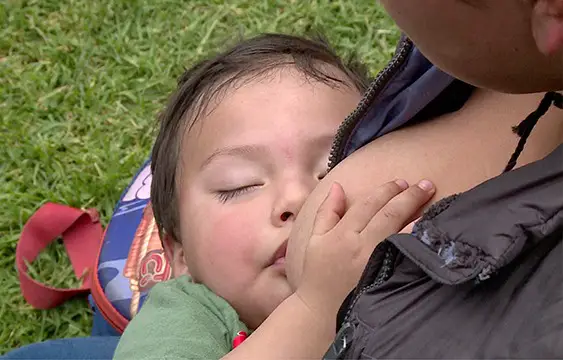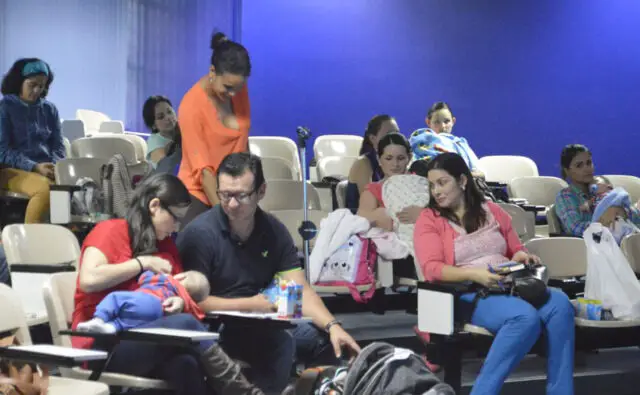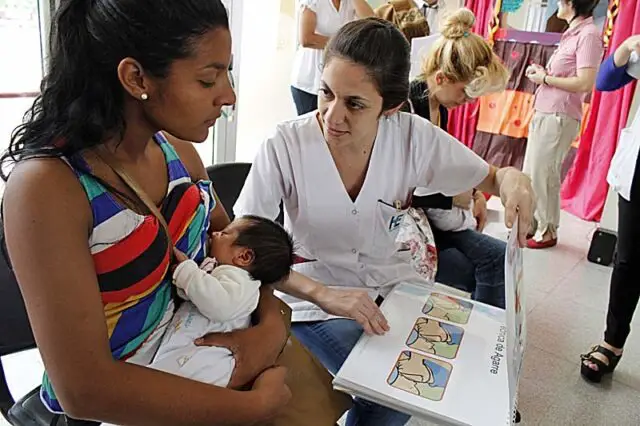Although the recommendation of the health authorities is that babies take exclusive breastfeeding for at least the first six months of life, in Costa Rica maternity leave only lasts three months and breastfeeding leaves are seldom respected at all times.
Almost two years ago, María Juana (36) had just given birth to her son in a public hospital in San José. Her plan was to have a vaginal delivery; however, after several hours it was impossible and she had to be prepared for a cesarean section.
“I wanted to have a vaginal delivery because I thought it was the best way to recover and I felt it was easier. I tried for too many hours and it was not successful. So I had to go for a cesarean section. When my baby was born I could barely see him and then they transferred me to another room to recover because between the anesthesia bombshell and the hormones it is a pretty hard process,” she says.
Abrupt changes

During postpartum, women face very abrupt hormonal changes, both progesterone and estrogen fall and it is when oxytocin and prolactin rise that stimulate the production of breast milk. For María, this was another of the fundamental themes: giving her son breast milk.
“When you have a cesarean, they don’t give you the baby right away like those who have a vaginal delivery. That was very hard because in the middle of my recovery I was worried about whether the baby had already eaten or was starving. Of course they had already given him a formula”, she explains.
When Mary was finally reunited with her baby, that was when the struggle began to make the baby want to breastfeed. “It was very difficult for me to attach the baby to the teat, so I had a lot of nurses helping me and I was there until I sweated. But of course there is all kinds of people, some very kind who helped me and stayed there with me until I achieved it and others that made me feel that it was my fault that the baby did not breastfeed,” says María and recalls a precise comment that affected her a lot.
“A nurse, I never knew exactly, came by and said ‘mom give that baby food’ because I was crying and that destroyed me. I had been trying for hours, I was sore because of the hormones, and they tell me that, it was horrible even though it is not a big deal but it affected me”.
Each mother and each baby is a world, so many times it is a process that needs to be individualized

The pediatric nurse and breastfeeding specialist, Marilyn Barrantes, explains that the postpartum process is not exclusively physical pain but that there is also an emotional pain that the mother goes through due to hormones and the excitement of meeting the baby that has been waiting for months.
“Really in the postpartum period, not only does the wound hurt due to a cesarean section or the sting, as they say, if it was due to a vaginal delivery, not only the nipples, the emotions hurt and that must be taken into account for its accompaniment”, explains Barrantes .
Misinformation and lack of support in breastfeeding

According to data from the Costa Rican Social Security Fund (CCSS), less than 27% of babies receive exclusive breastfeeding up to six months, which is the minimum they recommend.
The linguistic therapist, Mariana Valverde, made the decision to obtain a master’s degree in breastfeeding when she saw the need that future mothers presented for information on breastfeeding.
“The need for information about breastfeeding is too great, be it as part of the process, to understand that pain is not normal, one thing is sensations and a very different thing is that it is painful. And the other part is the misinformation of the mother’s rights if she works,” says the specialist.
Lack of support

Barrantes also agrees that the lack of information is abundant and also adds that mothers lack a lot of support. “The lack of support that mothers receive, the lack of information, causes mothers to decide not to continue breastfeeding. There is a study that says that it is not the lack of milk that slows down breastfeeding, it is the lack of information”, she comments.
In Valverde’s particular case, she has recently experienced breastfeeding, her baby is just a few months old. And despite being an expert on the subject, many times all the comments she receives from friends or family have made her doubt.
“There are so many comments that people make about one’s baby, that imagine that I have studies on the subject and that I dedicate myself to this, I have doubted, I do not want to imagine a mother with very little information. As a result of these comments, I have thought many things that are not, such as that my milk is not enough for my baby. That is why the Pandemic has also been a benefit, because mother and baby receive fewer visits and have more time to create that bond and receive less such comments,” she says.
Both Valverde and Barrantes make a differentiation between mothers who from the beginning decide not to give breastfeeding in an informed way, knowing all the benefits it has and understanding its importance, to those who decide not to give it for fear of pain or other aspects that are have normalized but are actually the result of misinformation.
“If mom wants to give baby formula from the beginning, there is no problem with her doing it, as long as it is an informed and conscious decision, not based on myths or other people’s experiences. Each mother and each baby is a world and that must be taken into account ”, explains Valverde.
The system as the enemy of breastfeeding
María spent three days and two nights in the hospital, in the end they decided to let her leave because they considered that at home it would be a much calmer environment and in which breastfeeding would be easier. Similarly, the CCSS gave her a referral to go to one of the lactation clinics to study her case individually. For this, the institution has 21 specialized units.
“When they gave me permission to go, my baby was already eating, sometimes it was hard for me but at least I was able to. Like when I got home it was something else, I felt comfortable not with people passing by all the time. Besides, it was very hard to see other moms who were feeding their babies in two touches and I was there struggling,” she recalls.
Barrantes says that “breastfeeding is as natural as learning to run, but not how to breathe. From the moment we are born we know how to breathe, but to run we have to crawl, then walk and then run”.
“Breastfeeding is a beautiful process, but I never romanticize the first month of breastfeeding because it is the hardest. We are full of doubts, learning, meeting each other, meeting baby, it is a process of coupling, it is never easy. But mothers have to be sure of it, they have everything to be more than enough for their babies,” adds Barrantes.
But the breastfeeding process doesn’t end there, when mom and baby go home. The World Health Organization (WHO) recommends extending breastfeeding up to two years of age for girls and boys. However, this is a complicated process when the mother works. There are employers who do not respect the rights of the nursing mother and women who end up fighting for their productivity to be the same as when they did not have their babies.
WHO recommends killing breastfeeding up to 2 years of age
“We really continue to be very productive, we are working for the future of the country, for the adults of tomorrow, while breastfeeding them is preventive medicine. So, support is also needed from the Government. How long is the trial period in a job? More or less three months, the same is with breastfeeding at three months we are just adjusting to the issue of breastfeeding and we are separated from the baby”, Barrantes argues.
Valverde defines breastfeeding as something more than food and hence the importance of sustaining it as much as possible. “It is much more than food, it is comfort, it is a symbiosis, it is warmth.”
In María’s case, she made the decision to set up a milk bank early on and to continue to lactate in the office, a situation that was made easier for her because they had a “pretty decent” lactation room at their job.
“The system is made so that moms stop breastfeeding their babies after three months, you have to understand, you made a baby and it’s up to you. It is an extremely complicated task and since I had a whole support team, I cannot complain. But it was still complicated. If it weren’t for the Pandemic, I would have stopped breastfeeding my son much earlier, teleworking made things too easy for me, I no longer had to walk around all worried that the milk that I got wouldn’t get bad, that my son needed it to feed himself,” she says.
A similar case happened with several of the Barrantes patients, “I have had patients whose interest was not to prolong breastfeeding so much but as a result of the Pandemic and teleworking they have had the opportunity to continue breastfeeding.”
Currently, women have three months of maternity leave from delivery, and then, if they are nursing mothers, they have one hour of breastfeeding a day and in addition to this hour, the right of 15 minutes every three hours to lactate. “The extraction of milk is a physiological necessity, the breasts are filling and if it is not extracted it weighs and there may be spills”, explains Valverde.
The CCSS is one of the main promoters of breastfeeding
For María, her experience in breastfeeding showed her how strong and capable she could be, but she is aware that it was an achievement because she was persistent in her desire and surrounded herself with supportive people.
“I am very grateful to have been able to breastfeed. It was the most challenging and difficult experience, but at the same time the most satisfying and the most beautiful moments with my son. That is where you realize that you are powerful and that you did it. But we need a system that supports us because later when we go to work we deprive ourselves of sleep and other things in order to have the same performance as before, and for obvious reasons that is almost impossible”.

